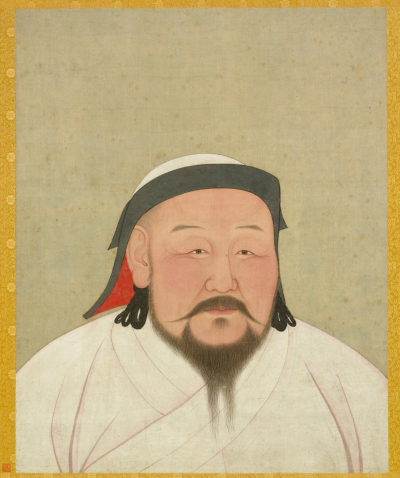The Yuan dynasty (Chinese: ; pinyin: Yuncho), officially the Great Yuan (Chinese: ; pinyin: D Yun; Middle Mongolian: , Yeke Yuwan Ulus, literally "Great Yuan State"), was a Mongol-led imperial dynasty of China and a successor state to the Mongol Empire after its division. It was established by Kublai, the fifth khagan-emperor of the Mongol Empire from the Borjigin clan, and lasted from 1271 to 1368. In orthodox Chinese historiography, the Yuan dynasty followed the Song dynasty and preceded the Ming dynasty.
Although Genghis Khan had been enthroned with the Han-style title of Emperor in 1206 and the Mongol Empire had ruled territories including modern-day northern China for decades, it was not until 1271 that Kublai Khan officially proclaimed the dynasty in the traditional Han style, and the conquest was not complete until 1279 when the Southern Song dynasty was defeated in the Battle of Yamen. His realm was, by this point, isolated from the other Mongol-led khanates and controlled most of modern-day China and its surrounding areas, including modern-day Mongolia. It was the first dynasty founded by a non-Han ethnicity that ruled all of China proper. In 1368, following the defeat of the Yuan forces by the Ming dynasty, the Genghisid rulers retreated to the Mongolian Plateau and continued to rule until 1635 when they surrendered to the Later Jin dynasty (which later evolved into the Qing dynasty). The rump state is known in historiography as the Northern Yuan dynasty.Some of the Yuan emperors mastered the Chinese language, while others only used their native Mongolian language and the 'Phags-pa script.After the division of the Mongol Empire, the Yuan dynasty was the khanate ruled by the successors of Mngke. In official Chinese histories, the Yuan dynasty bore the Mandate of Heaven. The dynasty was established by Kublai Khan, yet he placed his grandfather Genghis Khan on the imperial records as the official founder of the dynasty and accorded him the temple name Taizu. In the edict titled Proclamation of the Dynastic Name issued in 1271, Kublai announced the name of the new dynasty as Great Yuan and claimed the succession of former Chinese dynasties from the Three Sovereigns and Five Emperors to the Tang dynasty.In addition to Emperor of China, Kublai also claimed the title of Great Khan, supreme over the other successor khanates: the Chagatai, the Golden Horde, and the Ilkhanate. As such, the Yuan was also sometimes referred to as the Empire of the Great Khan. However, while the claim of supremacy by the Yuan emperors was at times recognized by the western khans, their subservience was nominal and each continued its own separate development.
Kublai (; also spelled Qubilai or Kübilai; Mongolian: Хубилай, romanized: Khubilai ; Chinese: 忽必烈; pinyin: Hūbìliè; 23 September 1215 – 18 February 1294), reigning from 1260 to 1294 as Setsen Khan (ᠰᠡᠴᠡᠨᠬᠠᠭᠠᠠᠨ; 薛禪汗) and Kublai Emperor (忽必烈皇帝), was the fifth khagan-emperor of the Mongol Empire, although after the division of the empire this was a nominal position. He proclaimed the empire's dynastic name "Great Yuan" in 1271, and ruled Yuan China until his death in 1294, known posthumously as Emperor Shizu of Yuan (Chinese: 元世祖; pinyin: Yuán Shìzǔ) by his temple name Shizu.
Kublai was the fourth son of Tolui (his second son with Sorghaghtani Beki) and a grandson of Genghis Khan. He was almost 12 when Genghis Khan died and had succeeded his older brother Möngke as Khagan in 1260, but had to defeat his younger brother Ariq Böke in the Toluid Civil War lasting until 1264. This episode marked the beginning of the fragmentation of the empire. Kublai's real power was limited to the Yuan Empire, even though as Khagan he still had influence in the Ilkhanate and, to a significantly lesser degree, in the Golden Horde. If one considers the Mongol Empire at that time as a whole, his realm reached from the Pacific Ocean to the Black Sea, from Siberia to what is now Afghanistan.In 1271, Kublai established the Yuan dynasty, which ruled over present-day China, Mongolia, Korea, and some adjacent areas; he also amassed influence in the Middle East and Europe as a Khagan. He assumed the role of Emperor of China. By 1279, the Mongol conquest of the Song dynasty was completed and Kublai became the first non-Han emperor to unite all of China proper.
The imperial portrait of Kublai was part of an album of the portraits of Yuan emperors and empresses, now in the collection of the National Palace Museum in Taipei. White, the color of the imperial costume of Kublai, was the imperial color of the Yuan dynasty.

1271Dec, 18
Kublai Khan renames his empire "Yuan" (元 yuán), officially marking the start of the Yuan dynasty of Mongolia and China.
Choose Another Date
Events on 1271
- 18Dec
Yuan dynasty
Kublai Khan renames his empire "Yuan" (元 yuán), officially marking the start of the Yuan dynasty of Mongolia and China.

 English
English  español
español  français
français  português
português  русский
русский  العربية
العربية  简体中文
简体中文 